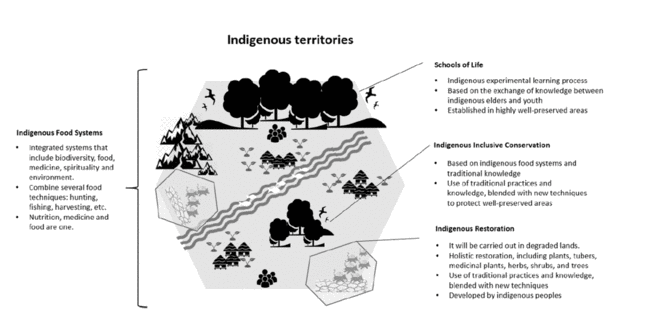Revitalization of Indigenous Peoples’ knowledge, values and food systems through the Schools of Life.
Indigenous peoples' knowledge is at the heart of this initiative. To preserve their ancestral food systems, Indigenous Peoples have developed complex and unique systems to preserve the ecosystems in their territories. The holistic perspective of Indigenous Peoples has shown that there is no well-being for people without a well-functioning food system, and this is entirely dependent on the health of the ecosystem.
Therefore, a key element of this initiative is the establishment of Schools of Life as a participatory learning process and a space for intra- and intergenerational transmission of knowledge, where communities work together in revitalising their knowledge, food and value systems to restore their territorial management system.
Expected results
- Indigenous Peoples' knowledge and territorial management systems are preserved and recognised globally as a key element for biodiversity conservation and territorial restoration.
- Degraded lands in Indigenous Peoples' territories are restored through an Indigenous Peoples' biocentric restoration approach, based on their knowledge, food and territorial management systems.
- A new, more inclusive model of biodiversity restoration and conservation based on respect for the collective rights of Indigenous Peoples is recognised and scaled up.
- Indigenous Peoples' participation, representation and recognition in the global debate on climate change and sustainable food systems is increased and their full and effective participation is ensured.
Projects
In 2022, FAO established a solid collaboration with Indigenous Peoples’ communities and local organizations in different countries to restore an estimated of 1000 has in Indigenous Peoples’ territories through the Indigenous Peoples’ Biocentric Approach.
Ecuador
| Provincia de Napo Asociación de Mujeres Kichwas y Asociación de Productores Alli Wamak Partner: INBAR |
India | Meghalaya Khasi people Partner: NESFAS |
Peru | Provincia Caylloma Quechua communities Partner: Centro Cindes |
Thailand | Chiang Rai and Mae Hong Son provinces Karen and Aka peoples Partners: AIPP- IMPECT |


